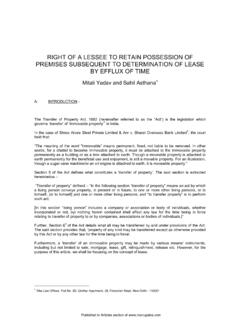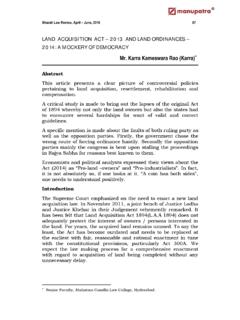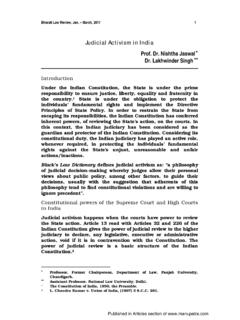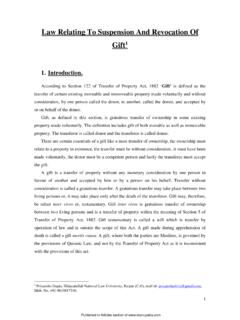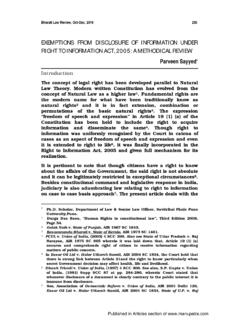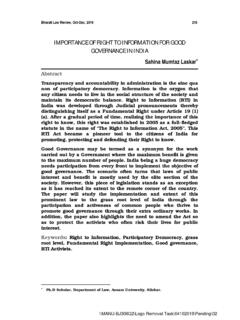Transcription of ASSIGNMENT OF RIGHTS AND ITS PRACTICAL RELEVANCE …
1 1 | P a g e ASSIGNMENT OF RIGHTS AND ITS PRACTICAL RELEVANCE IN FINANCIAL TRANSACTIONS: A LENDER S PERSPECTIVE Krishnendu Kanungo & Pritisha Chakraborty INTRODUCTION ASSIGNMENT means transfer of contractual RIGHTS or liability by a party to the contract to some other person who is not a party. It would not be wrong to say that as a matter of established principle, obligations are not assignable and once assigned it amounts to novation. For example, if A owes B INR. 500 and B owes C a like amount, B has the right to receive from A and is under liability to pay C. B can ask A to pay directly to C and if A accepts, that will be an ASSIGNMENT of B s right to C.
2 Considering the same situation if instead of transferring such a right B would have transferred any of his obligation in the matter, it would have amounted to novation. Section 37 of the Indian contract Act, 1872 enables parties to dispense with performance by way of ASSIGNMENT . The debtor is not a party to the transaction and his consent is not required for its validity. Assignments of receivables out of transactions are growing at an astronomical rate; in the world of finance the intricacies of such transactions are of immense importance. Notice should be taken of the fact that the concept of ASSIGNMENT is embedded both in the Indian contract Act, 1872 and Transfer of Property Act, 1882, in form and content.
3 It is a choice available to lenders to secure themselves against the adversities that may arise in the due course. A lender generally secures its transactions by way of mortgage & hypothecation over the immovable and movable properties of the borrower respectively. This is a well-known fact. In recent times the trend in certain high risk transactions has been to secure the loan by way of assigning contractual RIGHTS , along with the other securities such as mortgage and hypothecation, depending upon the nature of the transaction. While the current level of commercial use of ASSIGNMENT has never been seen in the past, ASSIGNMENT of debts or contractual benefits has been there ever since the law of contract has existed, and has almost been the same over the ages.
4 The word ASSIGNMENT is used in the context of incorporeal, that is, intangible assets. Corporeal assets are transferred; incorporeal assets are assigned, as the physical dimension of transfer, meaning change of hands, is not applicable in case of intangible assets. But with regard to ASSIGNMENT of contractual RIGHTS or benefits, there lies intricate documentation. As per the existing laws in India, such transfer of contractual RIGHTS cannot occur without it being brought into writing. Section 130 of the Transfer of Property Act, 1882 implies that every actionable claim may be transferred and it points out as to how it may be transferred. The requirement of an instrument for such a transfer often makes it too expensive for the parties involved in the transaction.
5 This paper seeks to deal with question of PRACTICAL usage of ASSIGNMENT in general day to day financial transactions in content and form. WHAT KIND OF contract IS ASSIGNABLE? : PRUDENCE OR PATIENCE? The common law did give effect to three kinds of transactions, viz. novation, acknowledgement and power of attorney, which to some extent did the work of As per the Indian contract law, any type of contract may be assigned as long as there is consent involved in the ASSIGNMENT . It needs to be looked at from the perspective of the parties. In such contracts, there are three parties involved, namely, the assignor, assignee and the obligor. A contract entered into between two parties, relying on the personal skills of the promisor , cannot be assigned under any circumstances.
6 This is such because of the plain reason that the promisee had 5th Year, Hidayatullah National Law University, Raipur 1 Marshall, The ASSIGNMENT of Choses in Action; Bailey, 47 526; 48 248, 547. Published in Articles section of | P a g e entered into the contract solely on the basis of the expertise which the promisor is possessed of. It is true in cases of contracts relating to like qualities or qualifications. The judicial trend in India has reiterated this position time and again. It has lain down; RIGHTS under a contract are freely assignable unless: a) The contract is of a personal nature; b) The RIGHTS are incapable of ASSIGNMENT either under law or under an agreement between the parties.
7 Hence, if the parties intend to restrict assignability, it is best to state the intent expressly in the contract . Likewise it should also be noted that it is prudent to expressly record a party s right to assign, if that is the intention. Any agreed limitation on such ASSIGNMENT should be expressly laid down in the contract in its boiler-plate sections, to avoid adverse consequences. Care and caution should be exercised while drafting a contract . The treatment may be different depending on the nature of the contract . For example, in agreements with private equity investors, it is common to see a right to freely assign RIGHTS and obligations in favour of its affiliates.
8 A pre-consent of other parties to the agreement is obtained through such clauses, and all that is usually required to give the ASSIGNMENT effect is the execution of a deed of adherence between the assignor and the assignee. Thus it is deemed prudent to state the intent as to ASSIGNMENT in a contract in its boiler-plate sections to avoid any adverse legal consequences in the future. MODES OF ASSIGNMENT : AVAILABLE RECOURSES? It is both RIGHTS under a contract which may be assigned. Due note should be taken of the fact that obligations under a contract cannot be assigned unless without the consent of the counterparty to the contract .
9 Neither In law nor in equity could the burden under a contract be shifted off the shoulders of the contractor on to those of another without the consent of the The principle that the burden under a contract cannot be transferred so as to discharge the original contractor without the consent of the other party means that, as a general rule, the assignee of the benefit of a contract involving mutual RIGHTS and obligations does not acquire the assignor s contractual The introduction of the new party to an existing contract would itself amount to a novation of the existing contract , that is, the creation of a new contract between the original party and the new party.
10 Courts have proceeded on the basis that a transfer of obligations can be effectuated only through a novation. Hence, the ASSIGNMENT clauses in contracts should also deal with novation, if the intention is to transfer obligations as well and such intention should be intimated to the party concerned. The intention of the parties is to be gathered from the nature of the agreement and the surrounding circumstances. Nevertheless, in law, there is a clear distinction between ASSIGNMENT of RIGHTS under a contract by a party who has performed his obligations there under, and ASSIGNMENT of a claim for compensation which one party has against the other for breach of contract .
